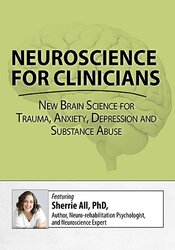
Get immediate lifetime access to this content by purchasing the digital seminar/online course instead that you can access using a variety of devices, and one CE certificate is included with purchase! Click the “Digital Seminar” or "Online Course" link below to learn more!
DVD Purchasers please note: In order to view the content, you will be required to have a DVD player or a DVD drive on your computer. Your CE is a separate fee.

Neuroscience has given us incredible insights into the workings of the brain and its connection to our mental health. Recent research reveals that neuroplasticity takes place all through life, so you can offer hope for real change no matter how long your client has suffered. But talking to your clients about their brain and what’s happening inside it is often difficult or overwhelming.
Learning how to not only communicate with clients about the brain but what specifically is going on inside of theirs has immense value in improving interventions and client compliance. Making neuroscience a must-have in every clinician’s toolbox when looking for creating lasting change.
In this workshop, you will participate in enjoyable learning experiences that provide you with the clear principles and background you need for utilizing neuroscience in your work. You will learn:
Easily and confidently incorporate these effective neuroscience techniques and tools into your very next treatment session!
Planning Committee Disclosure - No relevant relationships
All members of the PESI, Inc. planning committee have provided disclosures of financial relationships with ineligible organizations and any relevant non-financial relationships prior to planning content for this activity. None of the committee members had relevant financial relationships with ineligible companies or other potentially biasing relationships to disclose to learners. For speaker disclosures, please see the faculty biography.
Continuing education credit information is coming soon for this non-interactive self-study package.
CE hours may be available for select professions, as listed in the target audience. Hours will be dependent on the actual recording time. Please check with your state licensing board or organization for specific requirements.
There may be an additional fee for CE certificates. Please contact our Customer Service at 1-800-844-8260 for more details.
**Materials that are included in this course may include interventions and modalities that are beyond the authorized practice of your profession. As a licensed professional, you are responsible for reviewing the scope of practice, including activities that are defined in law as beyond the boundaries of practice in accordance with and in compliance with your professions standards.

Sherrie All, PhD, is a neuropsychologist and an engaging speaker and writer whose expertise in the principles of neuroscience, functional neuroanatomy, and diagnostics give her a unique insight into the correlation between mental health disorders, therapeutic approaches, and what happens in the brain itself.
Dr. All is the owner of the Chicago Center for Cognitive Wellness where she combines her strong background in CBT with mindfulness techniques, motivational interviewing and dynamic interpretations to help her clients manage depression, stress, anxiety, mental illness and cognitive challenges. A trained neuropsychologist who received her Ph.D. from Rosalind Franklin University, she also brings her detailed understanding of the brain to uniquely address the needs of people with traumatic brain injuries, dementia, and other conditions.
Speaker Disclosures:
Financial: Sherrie All is the owner of Chicago Center for Cognitive Wellness. She receives royalties as a published author. Sherrie All receives a speaking honorarium and recording royalties from PESI, Inc. She has no relevant financial relationships with ineligible organizations.
Non-Financial: Sherrie All is a member of the American Psychological Association.
Access never expires for this product.
Visit our FAQ page at www.pesi.com/faq or contact us at www.pesi.com/info
Satisfaction Guarantee
Your satisfaction is our goal and our guarantee. Concerns should be addressed to: PO Box 1000, Eau Claire, WI 54702-1000 or call 1-800-844-8260.
ADA Needs
We would be happy to accommodate your ADA needs; please call our Customer Service Department for more information at 1-800-844-8260.
PESI Mobile App
Access CE trainings on your phone or tablet through our free mobile app. Choose video or audio-only versions of online courses from the world’s best instructors, and complete your CE requirements anywhere, anytime, at your own pace.
Please wait ...